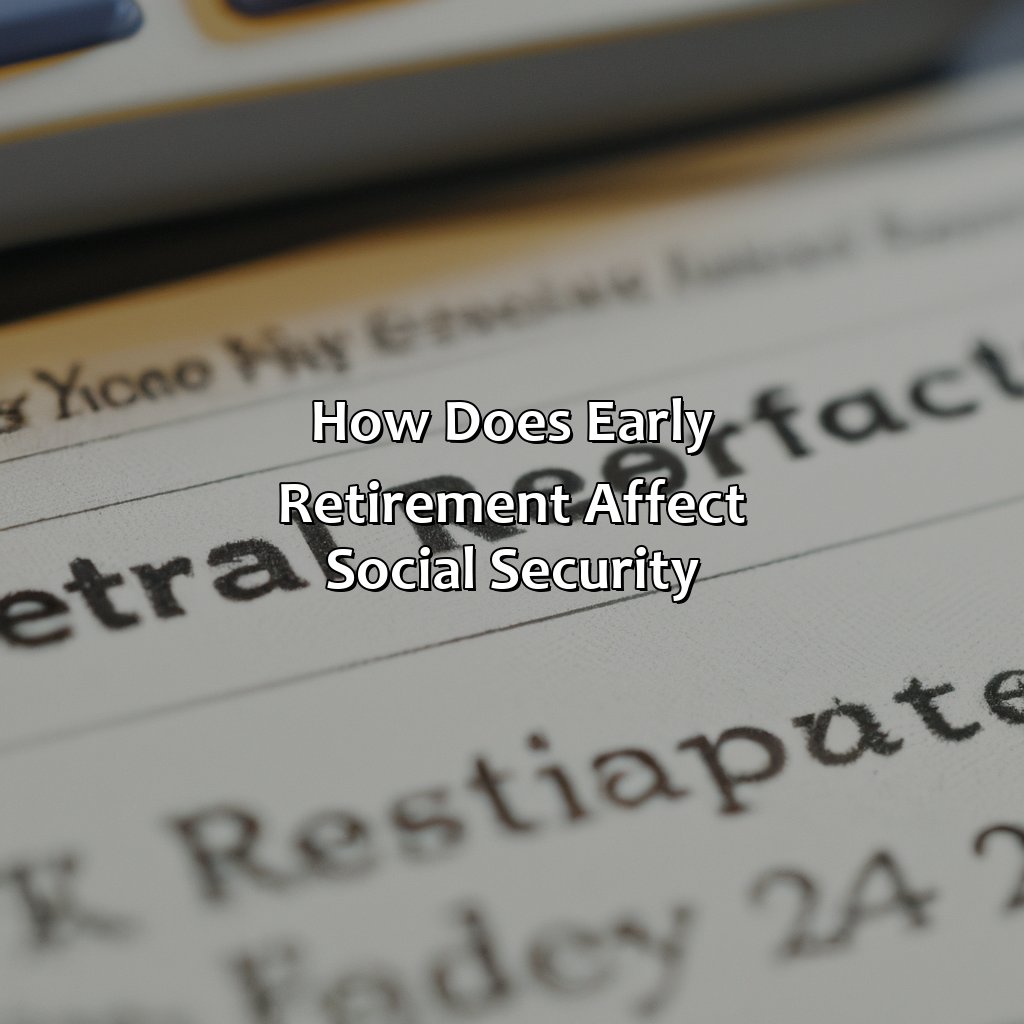How Does Early Retirement Affect Social Security?
Key Takeaway:
\n
- Early retirement may affect social security benefits: Retiring before full retirement age can lead to a reduction in benefits. It is important to understand the eligibility criteria and factors affecting social security benefits for early retirees.
- Factors affecting social security benefits for early retirees: Age at retirement and the number of years of contributions, along with earnings limits, can play a significant role in determining social security benefits for early retirees. Spousal and survivor benefits can also be impacted.
- Strategies to maximize social security benefits for early retirees: Delaying retirement credits can help in increasing social security benefits. Coordinating benefits with a spouse and considering alternative retirement income sources can also help in maximizing benefits.
\n
\n
Are you worried about how retiring early will affect your social security benefits? You’re not alone- this article will examine the impacts of early retirement on your social security. Taking the steps to prepare for an early retirement can be crucial to enjoying a financially secure future.
Early retirement basics and eligibility for social security
Early retirement refers to retiring before the age of full retirement, which is currently 66 years and 2 months for those born between 1955 and 1959. Eligibility for social security is determined by the number of years worked. To receive benefits, a worker must have accumulated at least 40 credits, which is equivalent to 10 years of work. The amount of social security benefits received by a retired worker is based on the average indexed monthly earnings (AIME) over the 35 highest-earning years.
The decision to retire early can impact social security benefits. If a person retires before reaching full retirement age, their benefits will be reduced by a certain percentage depending on how early they retire. For example, if a person retires at the age of 62, their social security benefits will be reduced by up to 30%.
It is important to note that if a person chooses to continue working after beginning to receive social security benefits, their benefits may be subject to additional taxation. The Social Security Administration (SSA) sets an earnings limit each year, and if a person earns more than that limit, their benefits will be reduced.
According to the SSA, approximately 43% of retired workers claim benefits at age 62, which is the earliest age at which one can start receiving social security benefits. This suggests that many individuals value immediate access to retirement income, even if it means a reduction in their benefits.
A true fact to consider is that the Social Security Administration was created in 1935 by President Franklin D. Roosevelt’s New Deal.

Image credits: retiregenz.com by Joel Duncun
Factors that affect social security benefits for early retirees
In our modern age of retirement, there are various aspects that affect Social Security benefits for early retirees. These aspects can make a distinct impact on the benefits received, from the age of retirement to the amount of earnings made in the past years that determine their benefit calculations.
Points that affect Social Security benefits for early retirees include:
- Retirement age – The younger the age of retirement, the lesser the number of benefits.
- Earnings history – A person’s past earnings determine their benefit calculation.
- Earnings after retirement – If benefits are accessed before their retirement age and earnings made after retirement exceed the yearly limit, there may be a decrease in the Social Security benefits.
- Benefit calculation – The method used to calculate Social Security benefits is a critical aspect that impacts early retirees’ Social Security benefits.
- Government pension offset – Government employees who receive a pension may see a decline in the Social Security benefits received.
- Divorced spouses – Early retirees who are divorced may have unique options for Social Security benefits depending on their ex-spouse’s work history.
Interestingly, Social Security benefit claims also depend on the year of birth. The baby boomer generation, born between 1943 and 1954, is eligible for full retirement benefits between 66 and 67 years of age. Those born after this period may encounter additional changes and restrictions.
When Social Security benefits were first introduced providing retirement aid for the elderly in America in 1935, the full benefit age was 65, and the following year, the Social Security Act was signed into law. Since then, various modifications have been done that have impacted the rules and regulations governing Social Security benefits.

Image credits: retiregenz.com by Joel Arnold
Strategies to maximize social security benefits for early retirees
In order to enhance Social Security benefits for those retiring early, various strategies can be implemented. These strategies include delaying benefits, lowering taxable income, and maximizing lifetime earnings, among others. Delaying benefits until the age of 70 and avoiding early withdrawals from retirement accounts are also recommended. Additionally, low-income retirees may qualify for additional benefits such as Supplemental Security Income. Managing these strategies effectively can lead to a significant increase in overall retirement income.
It is important to note that maximizing Social Security benefits is a complex and highly individualized process. Each retiree’s situation is unique, and certain strategies may be more appropriate than others. As a result, it is recommended to seek advice from financial advisors or Social Security professionals in order to develop a comprehensive plan.
One example of successful implementation of these strategies is a couple who delayed taking Social Security until their full retirement age, while simultaneously using other sources of income to fund their retirement. Through careful planning and adherence to a long-term strategy, they were able to effectively maximize their Social Security benefits and achieve a comfortable retirement.
By implementing these strategies, early retirees can increase their Social Security benefits and ensure a more secure financial future. However, it is important to carefully consider individual circumstances and seek professional advice before making any significant financial decisions.

Image credits: retiregenz.com by Adam Duncun
Some Facts About How Early Retirement Affects Social Security:
Claiming Social Security benefits early (at age 62) can result in a permanent reduction in benefits. (Source: Social Security Administration)
The reduction in benefits can range from 20-30% depending on the year of birth. (Source: CNBC)
Delaying Social Security benefits until full retirement age (between 66 and 67) can increase the monthly benefit amount. (Source: AARP)
If one spouse claims Social Security benefits early, it can also affect the survivor’s benefit amount after the first spouse’s death. (Source: Kiplinger)
Working while receiving Social Security benefits before full retirement age can result in a reduction in benefits. (Source: Social Security Administration)
FAQs about How Does Early Retirement Affect Social Security?
How does early retirement affect social security?
Early retirement can affect your social security benefits in a couple of ways. If you retire early, you may receive a reduced monthly benefit amount since you will receive payments over a longer period of time.
What is the earliest age I can retire and still collect social security?
The earliest age you can retire and still collect social security benefits is 62 years old. However, if you retire at this age, your benefit amount will be reduced compared to waiting until your full retirement age.
How much will my social security benefit be reduced if I retire early?
If you retire early, your social security benefit amount will be reduced by a certain percentage for each month that you receive payments before your full retirement age. The reduction amount varies based on when you were born and the number of months you retire early.
Will my social security benefit amount increase if I retire later than my full retirement age?
If you delay your retirement past your full retirement age, your monthly social security benefit amount will increase. The amount of increase varies based on when you were born and how long you delay your retirement.
Can I still work and collect social security if I retire early?
Yes, you can still work and collect social security benefits if you retire early. However, if you earn over a certain limit, your benefits may be reduced. Once you reach your full retirement age, you can work and earn any amount without affecting your social security benefits.
What happens to my social security benefits if I die before retirement age?
If you die before your full retirement age and have paid social security taxes for a certain amount of time, your spouse or eligible family members may receive survivor benefits. The amount of benefits will depend on a variety of factors, including your work history and age at the time of your death.
 Checkout this IRS Loophole
Checkout this IRS Loophole 





